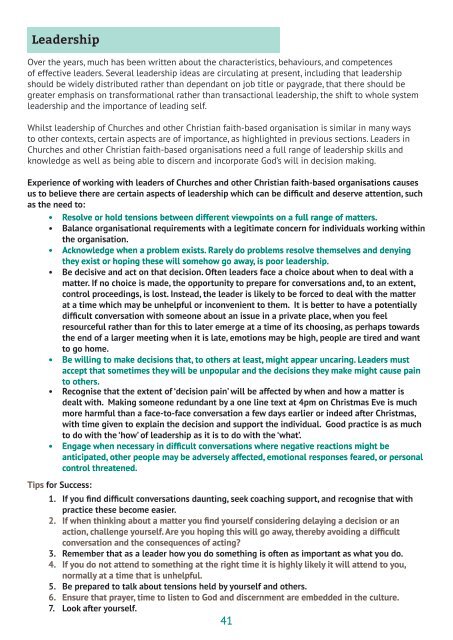Burnout in Churches and Christian Faith-Based Organisations
Burnout is a “syndrome of emotional exhaustion, depersonalization and reduced personal accomplishment that can occur among individuals who work with people in some capacity (Maslach 1996:193). This definition, whilst helpful, fails to convey the potentially life-shattering impact that burnout can have, as described in the words of ‘Peter’, a Christian leader who contributed to this guidance.
Burnout is a “syndrome of emotional exhaustion, depersonalization and reduced personal accomplishment that can occur among individuals who work with people in some capacity (Maslach 1996:193).
This definition, whilst helpful, fails to convey the potentially life-shattering impact that burnout can have, as described in the words of ‘Peter’, a Christian leader who contributed to this guidance.
You also want an ePaper? Increase the reach of your titles
YUMPU automatically turns print PDFs into web optimized ePapers that Google loves.
Leadership<br />
Over the years, much has been written about the characteristics, behaviours, <strong>and</strong> competences<br />
of effective leaders. Several leadership ideas are circulat<strong>in</strong>g at present, <strong>in</strong>clud<strong>in</strong>g that leadership<br />
should be widely distributed rather than dependant on job title or paygrade, that there should be<br />
greater emphasis on transformational rather than transactional leadership, the shift to whole system<br />
leadership <strong>and</strong> the importance of lead<strong>in</strong>g self.<br />
Whilst leadership of <strong>Churches</strong> <strong>and</strong> other <strong>Christian</strong> faith-based organisation is similar <strong>in</strong> many ways<br />
to other contexts, certa<strong>in</strong> aspects are of importance, as highlighted <strong>in</strong> previous sections. Leaders <strong>in</strong><br />
<strong>Churches</strong> <strong>and</strong> other <strong>Christian</strong> faith-based organisations need a full range of leadership skills <strong>and</strong><br />
knowledge as well as be<strong>in</strong>g able to discern <strong>and</strong> <strong>in</strong>corporate God’s will <strong>in</strong> decision mak<strong>in</strong>g.<br />
Experience of work<strong>in</strong>g with leaders of <strong>Churches</strong> <strong>and</strong> other <strong>Christian</strong> faith-based organisations causes<br />
us to believe there are certa<strong>in</strong> aspects of leadership which can be difficult <strong>and</strong> deserve attention, such<br />
as the need to:<br />
• Resolve or hold tensions between different viewpo<strong>in</strong>ts on a full range of matters.<br />
• Balance organisational requirements with a legitimate concern for <strong>in</strong>dividuals work<strong>in</strong>g with<strong>in</strong><br />
the organisation.<br />
• Acknowledge when a problem exists. Rarely do problems resolve themselves <strong>and</strong> deny<strong>in</strong>g<br />
they exist or hop<strong>in</strong>g these will somehow go away, is poor leadership.<br />
• Be decisive <strong>and</strong> act on that decision. Often leaders face a choice about when to deal with a<br />
matter. If no choice is made, the opportunity to prepare for conversations <strong>and</strong>, to an extent,<br />
control proceed<strong>in</strong>gs, is lost. Instead, the leader is likely to be forced to deal with the matter<br />
at a time which may be unhelpful or <strong>in</strong>convenient to them. It is better to have a potentially<br />
difficult conversation with someone about an issue <strong>in</strong> a private place, when you feel<br />
resourceful rather than for this to later emerge at a time of its choos<strong>in</strong>g, as perhaps towards<br />
the end of a larger meet<strong>in</strong>g when it is late, emotions may be high, people are tired <strong>and</strong> want<br />
to go home.<br />
• Be will<strong>in</strong>g to make decisions that, to others at least, might appear uncar<strong>in</strong>g. Leaders must<br />
accept that sometimes they will be unpopular <strong>and</strong> the decisions they make might cause pa<strong>in</strong><br />
to others.<br />
• Recognise that the extent of ‘decision pa<strong>in</strong>’ will be affected by when <strong>and</strong> how a matter is<br />
dealt with. Mak<strong>in</strong>g someone redundant by a one l<strong>in</strong>e text at 4pm on Christmas Eve is much<br />
more harmful than a face-to-face conversation a few days earlier or <strong>in</strong>deed after Christmas,<br />
with time given to expla<strong>in</strong> the decision <strong>and</strong> support the <strong>in</strong>dividual. Good practice is as much<br />
to do with the ‘how’ of leadership as it is to do with the ‘what’.<br />
• Engage when necessary <strong>in</strong> difficult conversations where negative reactions might be<br />
anticipated, other people may be adversely affected, emotional responses feared, or personal<br />
control threatened.<br />
Tips for Success:<br />
1. If you f<strong>in</strong>d difficult conversations daunt<strong>in</strong>g, seek coach<strong>in</strong>g support, <strong>and</strong> recognise that with<br />
practice these become easier.<br />
2. If when th<strong>in</strong>k<strong>in</strong>g about a matter you f<strong>in</strong>d yourself consider<strong>in</strong>g delay<strong>in</strong>g a decision or an<br />
action, challenge yourself. Are you hop<strong>in</strong>g this will go away, thereby avoid<strong>in</strong>g a difficult<br />
conversation <strong>and</strong> the consequences of act<strong>in</strong>g?<br />
3. Remember that as a leader how you do someth<strong>in</strong>g is often as important as what you do.<br />
4. If you do not attend to someth<strong>in</strong>g at the right time it is highly likely it will attend to you,<br />
normally at a time that is unhelpful.<br />
5. Be prepared to talk about tensions held by yourself <strong>and</strong> others.<br />
6. Ensure that prayer, time to listen to God <strong>and</strong> discernment are embedded <strong>in</strong> the culture.<br />
7. Look after yourself.<br />
41



